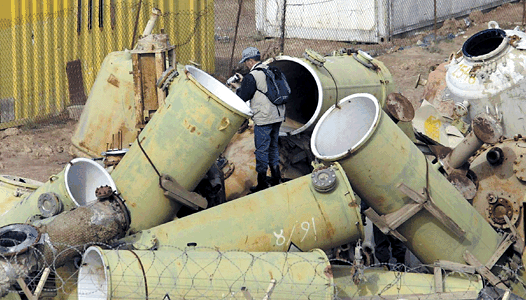Peace Prize Goes to Chemical Weapons Monitors
October 11, 2013
The 2013 Nobel Peace Prize was awarded today to the Organization for the Prohibition of Chemical Weapons (OPCW) “for its extensive efforts” to rid the world of such arsenals. “The conventions and the work of the OPCW have defined the use of chemical weapons as a taboo under international law,” declared Norwegian Nobel Committee chairman Thorbjoern Jagland in the announcement. “Recent events in Syria, where chemical weapons have again been put to use, have underlined the need to enhance the efforts to do away with such weapons.”
The OPCW, based in The Hague, Netherlands, was established to enforce the 1997 Chemical Weapons Convention, which has contributed to the destruction of nearly 80 percent of the world’s stockpile of chemical weapons. OPCW inspectors are currently overseeing the dismantling of Syria’s chemical weapons–the first time OPCW inspectors have worked in an active war zone.

A United Nations inspector examines dismantled equipment used during the 1980's and 1990's in Iraq's chemical weapons program. (Reuters/Getty Images)
In late September, Syria began reporting details of its chemical weapons stockpile as part of a U.S.-Russia brokered deal. The deal–a framework for a plan to secure and destroy Syria’s chemical weapons by mid-2014–was brokered on September 14 by U.S. Secretary of State John Kerry and Russian Foreign Minister Sergei Lavrov. It specified that Syria was to submit a “comprehensive listing, including names, types, and quantities of its chemical weapons agents. . . . .” Among other provisions, Syria must also give United Nations inspectors, scheduled to be on the ground by November, “immediate and unfettered” access to all chemical weapons storage, production, research, and development sites.
The deal put on hold the threat of a U.S. military strike against Syria for allegedly using chemical agents in an attack on August 21. The attack left more than 1,400 Syrians dead, including hundreds of children. In a nationally televised address, President Barack Obama argued that the United States had a moral obligation to consider a military strike against Syria for the alleged chemical attack. “Our ideals and principles, as well as our national security, are at stake in Syria,” the president declared.
Additional World Book articles:
- Arab Spring
- The Middle East: From Fall to Spring (a special report)
- Syria: The Roots of Rebellion (a special report)
- Syria 2011 (a Back in Time article)
- Syria 2012 (a Back in Time article)


